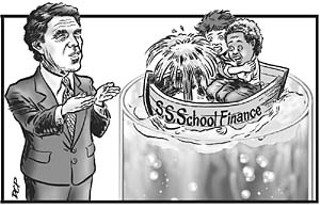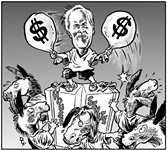Will It Float?
Bring out the slots and dancing girls – the governor wants excellence!
By Michael King, Fri., Feb. 6, 2004

Last week Gov. Rick Perry, in a series of public appearances and a few not-quite-private insider presentations by his chief of staff Mike Toomey, attempted to "float" (as they say in pundit-speak) a handful of proposals concerning public school finance. The public and private proposals don't entirely coincide (the guv was marketing financial incentive plans to administrators while Toomey was trying to sell taxation alternatives to business groups), but the trial balloons quickly accumulated one common feature: Both opened to negative reviews. The business groups reportedly balked at the notion that business property might be treated differently from residential property (allowing at least the possibility of statewide equity). And the school administrators found dubious Perry's notion that, rather than additional money, a redirected dollop of state financial rewards for high student test scores can meet the resource needs of school districts already tapped out on state and local funding.
It was bad enough that members of the Texas Association of School Administrators sat on their hands as Perry promised additional money for schools with few dropouts and high test scores – a plan that on its face (as expert analyses confirmed) would mean more money for already wealthy high schools (and that, as it stands, offers nothing for elementary and middle schools). But when he described his "$200 million Teacher Excellence Initiative" – which would provide bonuses to teachers whose students meet certain performance standards "as long as local districts match the state's financial commitment" – the assembled superintendents couldn't help themselves, and burst into open laughter. It didn't take a genius (although Perry's office could apparently use one) to figure out that if districts had any additional money for teachers, especially after last year's legislative cuts of the health care stipend, they would have already spent it.
Perry's presentations did result in one important step forward: The administrators and the Texas Association of School Boards announced that the two organizations – allying districts on both sides of the "Robin Hood" divide – are forming a coalition to advance the common interests of public schools. They officially rejected the governor's argument that the school crisis can be fixed without additional money. Referring sardonically to the Bush administration's unfulfilled promise of "No Child Left Behind," TASA head Dawson Orr (who hails from that radical hotbed Wichita Falls) described the Perry plan as "Most Kids Won't Get a Dime."
Perry's Fuzzy Math
The central problem with the governor's latest proposals is that his basic numbers simply don't add up. He insists that the schools do not need new money – just a greater commitment to "excellence" – and that his incentive program will cost only $500 million annually. Yet at present costs, the state's schools need at least that much each year in additional money just to keep up with growing enrollment – roughly 75,000 new Texas students annually. In what must be a first for a Texas governor, Perry repeatedly cited a figure he said was from the National Education Association – more often excoriated as a near-satanic "teachers' union" – that Texas schools receive (from all sources) $10,400 per student. By simple multiplication, that would mean more than $43 billion available for the state's 4.2 million public school students. But the Texas Education Agency, officially charged with tracking these funds, estimates all funds at less than $30 billion, or approximately $6,900 per student. Noted one educator, "If we had the kind of money Perry says we have, we'd be doing backflips."
At the local level, Perry's numbers parse just as badly. AISD, one of the theoretically "wealthy" districts in the state's Peter vs. Paul calculations, budgeted roughly $737 million for fiscal year 2003-2004 (including $158 million in recapture money taken off the top and sent to even poorer districts). According to the governor's figures, at $10,400 per student for 78,689 students, the district in fact had $818 million to spend – yet according to AISD staff last week, a search of the district's sofa cushions has thus far failed to turn up the missing $81 million, which would be more than enough to restore all of last year's AISD personnel and program cuts. Maybe they just overlooked it – or maybe, as superintendents were pointing out all over the state, the governor's speechwriters were imagining money where none exists in order to wish the funding crisis away.
As is his habit, Perry reacted petulantly when asked about the discrepancies, arguing furthermore that districts are keeping their fund balances (emergency cash reserves) unnecessarily high when they could be spending that money on students. That issue generated a bitter debate in last year's AISD budget fight between administrators and teachers – but it was the "fiscally conservative" position, that the district needs to maintain sufficient reserves to underwrite its bond ratings, that triumphed.
Maybe the Republican governor, having joined the NEA, thinks the school board should have blown the whole wad on salaries.
Right This Way! –
Meanwhile, Toomey was meeting privately with business groups to see if he could sell them on a tax restructuring plan that would in theory raise the current amount of money – remember, the Guv says your kid's school is doing just fine – while radically lowering local property taxes. (It hardly bears remarking that private consultation with business interests is how we set public policy in Texas.) According to secondhand reports, the central feature is a "split" property tax roll, with businesses taxed statewide at one rate (reportedly $1.40) and local residential rates capped at $1.25 (and, most importantly, freeing the small cabal of high-dollar suburban districts to coddle their darlings at will, without even the pretense of equity).
The initial response from the suits has not been good – they worry that once singled out as commercial bourgeoisie, they won't be able to hide behind homeowners quite so easily. More fundamentally, even after closing the franchise loophole, that still won't raise enough cash. Apparently, Toomey's Sideshow Tour also proposes a $1 cigarette tax (an idea previously intended to fund also-starving health and human services), racetrack video lottery terminals, Indian casinos – and God (or the devil) knows what else. The new Republican Lege is already nervous about MegaMillions, but they may have to choose between taxing the lobby or fleecing the suckers.
What's next from the Perry Education Excellence Brain Trust? We hear there's real money to be made in Internet porn. ![]()
Got something to say on the subject? Send a letter to the editor.










